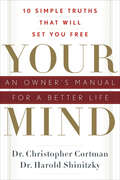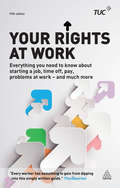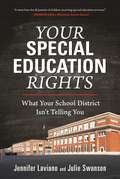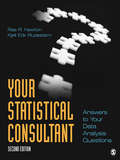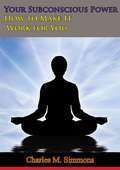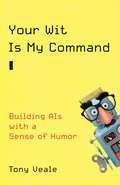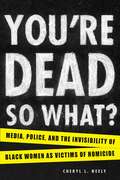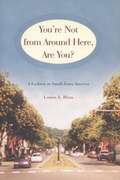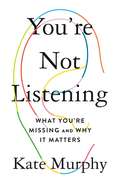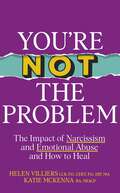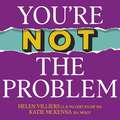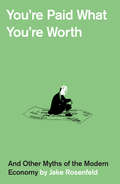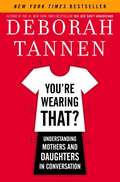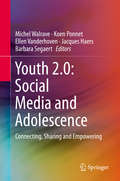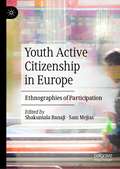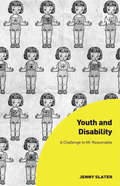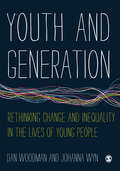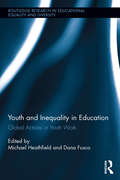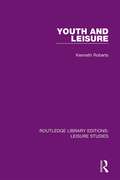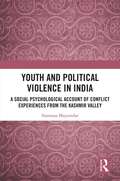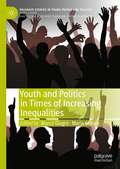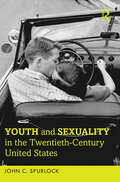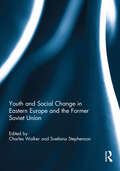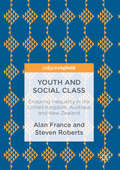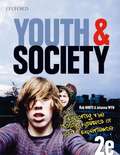- Table View
- List View
Your Mind: An Owner's Manual for a Better Life
by Dr. Christopher Cortman Harold ShinitzkyTen crucial psychological truths that provide “a clinical framework with concrete ways to tackle standing emotional issues” (Foreword Reviews).During tens of thousands of hours facilitating psychotherapy, Drs. Christopher Cortman and Harold Shinitzky came to realize that most people are unaware of ten crucial psychological truths—truths imperative to maintaining mental health and well-being. As a result of this lack of awareness, people become anxious, depressed, and generally unhappy; if they learn the ten truths, they are more likely to lead productive, fulfilled lives. Do you know that:Emotions are understandable and contain valuable information?Our behavior has a hidden purpose?We all have an internal saboteur whom we must identify and control?We can change how we act if we change how we think?Time heals nothing?Your Mind: An Owner’s Manual for a Better Life combines extensive psychological research with decades of clinical practice in a practical, easy-to-digest narrative. Through examples and exercises, Drs. Cortman and Shinitzky present a step-by-step strategy to help you make use of the truths and become a happier, healthier you.
Your Rights at Work: Everything You Need to Know About Starting a Job, Time off, Pay, Problems at Work - and Much More!
by Trades Union CongressYour Rights at Work is a comprehensive, jargon-free guide to the legal rights of the employee and the responsibilities of the employer. Accessible and reliable, it offers real solutions to the problems and issues that can face anyone at work. Using the law is always a last resort, but if you have to take that step, there is practical advice on that too. Topics covered include: starting a job; parental leave and maternity rights; flexible working; equality law; dismissal and redundancy; pay and holiday rights; grievance procedures and how to enforce your rights. Your Rights at Work is written by employment experts at the Trade Union Congress (TUC). As the people who campaigned for many of the rights set out in this book, there is no one better to explain how they should apply in your workplace and what to do if they don't.
Your Special Education Rights: What Your School District Isn't Telling You
by Jennifer Laviano Julie SwansonDrawing on decades of experience, Jennifer Laviano, a high-profile special education attorney, and Julie Swanson, a sought-after special education advocate, help parents of students with disabilities navigate their school systems to get the services they need for their children.Parents will find no other book on special education like Your Special Education Rights. Julie and Jennifer demystify the federal laws that govern the rights of public school children with disabilities and explain how school districts often ignore or circumvent these laws. They pull the curtain back on the politics of special education, exposing truths that school districts don’t want you to know, such as the fact that teachers are often under extraordinary pressure not to spend resources on services.Most importantly, they outline the central rights you and your child have regarding your child’s education. Did you know that you can refer your child for a special education evaluation? That you can ask for a second opinion if you disagree with the results of some or all of the testing? That you are entitled to parent counseling, training, and more?They also show you how to take that knowledge and apply it to advocating for your child. Here’s what you need to know about the paperwork you will have to complete, detailed information on how to advocate for your child and how to craft language in documents that benefit your child, and more.Filled with vital information and invaluable resources, Your Special Education Rights gives you the information you need to help your child succeed in school and beyond.
Your Statistical Consultant: Answers to Your Data Analysis Questions
by Dr Rae R. Newton Dr Kjell Erik RudestamAlthough many graduate students and researchers have had course work in statistics, they sometimes find themselves stumped in proceeding with a particular data analysis question. In fact, statistics is often taught as a lesson in mathematics as opposed to a strategy for answering questions about world[?], leaving beginning researchers at a loss for how to proceed. In these situations, it is common to turn to a statistical expert, the "go to" person when questions regarding appropriate data analysis emerge. Your Statistical Consultant is an authentic alternative resource for describing, explaining, and making recommendations regarding thorny or confusing statistical issues. Written to be responsive to a wide range of inquiries and levels of expertise, this book is flexibly organized so readers can either read it sequentially or turn directly to the sections that correspond to their concerns and questions.
Your Subconscious Power: How to Make It Work for You
by Charles M. SimmonsA step-by-step, day-by-day plan for gearing your everyday living to the powerful, life-shaping force within you…for lasting satisfaction and achievement!This book, which was first published in 1957, contains 10 Practice Projects that actually make you live with YOUR SUBCONSCIOUS POWER…that puts all its potential energies to work for you!“Charles M. Simmons has a unique place in the field of adult education. He has the ability to get people excited about their own possibilities without false stimulation—intoxication without alcohol! He is able to help them apply this enthusiasm and positive attitude for practical ends. He appeals to large groups of adults with high levels of intelligence and success. I can anticipate that his book—Your Subconscious Power—will be filled with his enthusiasm and wisdom. There’s never a dull moment with the Simmons approach!”—William B. McCoard, Ph.D., Professor of Speech, University of Southern California“Charles M. Simmons is making history. He will challenge you into action. His book helps focus action on fundamentals that get results. Its method is simple but powerful. Read the book carefully and things will happen! Read it and apply it—things will happen!”—Warren O. Wagner, Consulting Engineer, Pasadena, California
Your Wit Is My Command: Building AIs with a Sense of Humor
by Tony VealeFor fans of computers and comedy alike, an accessible and entertaining look into how we can use artificial intelligence to make smart machines funny.Most robots and smart devices are not known for their joke-telling abilities. And yet, as computer scientist Tony Veale explains in Your Wit Is My Command, machines are not inherently unfunny; they are just programmed that way. By examining the mechanisms of humor and jokes--how jokes actually works--Veale shows that computers can be built with a sense of humor, capable not only of producing a joke but also of appreciating one. Along the way, he explores the humor-generating capacities of fictional robots ranging from B-9 in Lost in Space to TARS in Interstellar, maps out possible scenarios for developing witty robots, and investigates such aspects of humor as puns, sarcasm, and offensiveness. In order for robots to be funny, Veale explains, we need to analyze humor computationally. Using artificial intelligence (AI), Veale shows that joke generation is a knowledge-based process--a sense of humor is blend of wit and wisdom. He notes that existing technologies can detect sarcasm in conversation, and explains how some jokes can be pre-scripted while others are generated algorithmically--all while making the technical aspects of AI accessible for the general reader. Of course, there's no single algorithm or technology that we can plug in to make our virtual assistants or GPS voice navigation funny, but Veale provides a computational roadmap for how we might get there.
You're Dead--So What? Media, Police, and the Invisibility of Black Women as Victims of Homicide
by Cheryl L. NeelyThis book provides an empirical study of media and law enforcement bias in reporting and investigating homicides of African-American women compared with their white counterparts. The author discusses the symbiotic relationship between media coverage and the response from law enforcement to victims of color. A deeply troubling disparity in reporting the disappearance and homicides of female victims reflects racial inequality and institutionalized racism in the social structure that need to be addressed.
You're Not from Around Here, Are You: A Lesbian in Small-Town America
by Louise A. BlumThis is a funny, moving story about life in a small town, from the point of view of a pregnant lesbian. Louise A. Blum, author of the critically acclaimed novel Amnesty, now tells the story of her own life and her decision to be out, loud, and pregnant. Mixing humor with memorable prose, Blum recounts how a quiet, conservative town in an impoverished stretch of Appalachia reacts as she and a local woman, Connie, fall in love, move in together, and determine to live their life together openly and truthfully. The town responds in radically different ways to the couple’s presence, from prayer vigils on the village green to a feature article in the family section of the local newspaper. This is a cautionary, wise, and celebratory tale about what it’s like to be different in America—both the good and the bad. A depiction of small town life with all its comforts and its terrors, this memoir speaks to anyone who has ever felt like an outsider in America. Blum tells her story with a razor wit and deft precision, a story about two "girls with grit," and the child they decide to raise, right where they are, in small town America.
You're Not Listening: What You're Missing and Why It Matters
by Kate MurphyWhen was the last time you listened to someone, or someone really listened to you?"If you’re like most people, you don’t listen as often or as well as you’d like. There’s no one better qualified than a talented journalist to introduce you to the right mindset and skillset—and this book does it with science and humor." -Adam Grant, #1 New York Times bestselling author of Originals and Give and Take"An essential book for our times."-Lori Gottlieb, New York Times bestselling author of Maybe You Should Talk to SomeoneAt work, we’re taught to lead the conversation.On social media, we shape our personal narratives.At parties, we talk over one another. So do our politicians.We’re not listening.And no one is listening to us.Despite living in a world where technology allows constant digital communication and opportunities to connect, it seems no one is really listening or even knows how. And it’s making us lonelier, more isolated, and less tolerant than ever before. A listener by trade, New York Times contributor Kate Murphy wanted to know how we got here.In this always illuminating and often humorous deep dive, Murphy explains why we’re not listening, what it’s doing to us, and how we can reverse the trend. She makes accessible the psychology, neuroscience, and sociology of listening while also introducing us to some of the best listeners out there (including a CIA agent, focus group moderator, bartender, radio producer, and top furniture salesman). Equal parts cultural observation, scientific exploration, and rousing call to action that's full of practical advice, You're Not Listening is to listening what Susan Cain's Quiet was to introversion. It’s time to stop talking and start listening.
You’re Not the Problem: The Impact of Narcissism and Emotional Abuse and How to Heal
by Katie McKenna Helen VilliersHelen & Katie's advice will change your life. It did mine. - Kay Allinson, co-founder of Pinch of NomThis book will show you what a narcissist looks like and how their emotional abuse impacts the lives and relationships of their families.Many emotionally abusive behaviours from parent to child have become socially acceptable; because they're so prolific, they're normalised. Furthermore, humans often repeat relational patterns, passing the baton of trauma from generation to generation, until someone decides to change things. You're Not the Problem shows you how to recognise these behaviours and realise the profound impact they have had, and still have, and to see the patterns they form in our relationships with parents, partners, friends and colleagues. Using stories and examples from their clinical experience and extensive research, psychotherapists Helen Villiers and Katie McKenna share: · What Narcissistic Personality Disorder is· How to recognise emotional abuse in family relationships· The immediate and long-term impact · Practical strategies for healing· How to avoid repeating these behaviours With a compassionate, sympathetic approach to looking at your familial patterns, Villiers and McKenna show you how to truly break free from these toxic relationships and reclaim your life.
You’re Not the Problem - Sunday Times bestseller: The Impact of Narcissism and Emotional Abuse and How to Heal
by Katie McKenna Helen VilliersTop 10 Irish Bestseller'Helen & Katie's advice will change your life. It did mine.' - Kay Allinson, co-founder of Pinch of NomThis book will show you what a narcissist looks like and how their emotional abuse impacts the lives and relationships of their families.Many emotionally abusive behaviours from parent to child have become socially acceptable; because they're so prolific, they're normalised. Furthermore, humans often repeat relational patterns, passing the baton of trauma from generation to generation, until someone decides to change things. You're Not the Problem shows you how to recognise these behaviours and realise the profound impact they have had, and still have, and to see the patterns they form in our relationships with parents, partners, friends and colleagues. Using stories and examples from their clinical experience and extensive research, psychotherapists Helen Villiers and Katie McKenna share: · What Narcissistic Personality Disorder is· How to recognise emotional abuse in family relationships· The immediate and long-term impact · Practical strategies for healing· How to avoid repeating these behaviours With a compassionate, sympathetic approach to looking at your familial patterns, Villiers and McKenna show you how to truly break free from these toxic relationships and reclaim your life.
You’re Paid What You’re Worth: And Other Myths Of The Modern Economy
by Jake RosenfeldA myth-busting book challenges the idea that we’re paid according to objective criteria and places power and social conflict at the heart of economic analysis.Your pay depends on your productivity and occupation. If you earn roughly the same as others in your job, with the precise level determined by your performance, then you’re paid market value. And who can question something as objective and impersonal as the market? That, at least, is how many of us tend to think. But according to Jake Rosenfeld, we need to think again.Job performance and occupational characteristics do play a role in determining pay, but judgments of productivity and value are also highly subjective. What makes a lawyer more valuable than a teacher? How do you measure the output of a police officer, a professor, or a reporter? Why, in the past few decades, did CEOs suddenly become hundreds of times more valuable than their employees? The answers lie not in objective criteria but in battles over interests and ideals. In this contest four dynamics are paramount: power, inertia, mimicry, and demands for equity. Power struggles legitimize pay for particular jobs, and organizational inertia makes that pay seem natural. Mimicry encourages employers to do what peers are doing. And workers are on the lookout for practices that seem unfair. Rosenfeld shows us how these dynamics play out in real-world settings, drawing on cutting-edge economics, original survey data, and a journalistic eye for compelling stories and revealing details.At a time when unions and bargaining power are declining and inequality is rising, You’re Paid What You’re Worth is a crucial resource for understanding that most basic of social questions: Who gets what and why?
You're Wearing That?: Understanding Mothers and Daughters in Conversation
by Deborah TannenMothers and daughters speak the same language, but often misunderstand each other, as they struggle to achieve a balance between closeness and independence.
Youth 2.0: Social Media and Adolescence
by Michel Walrave Koen Ponnet Ellen Vanderhoven Jacques Haers Barbara SegaertThis book grasps the duality between opportunities and risks which arise from children's and adolescents' social media use. It investigates the following main themes, from a multidisciplinary perspective: identity, privacy, risks and empowerment. Social media have become an integral part of young people's lives. While social media offer adolescents opportunities for identity and relational development, adolescents might also be confronted with some threats. The first part of this book deals with how young people use social media to express their developing identity. The second part revolves around the disclosure of personal information on social network sites, and concentrates on the tension between online self-disclosure and privacy. The final part deepens specific online risks young people are confronted with and suggests solutions by describing how children and adolescents can be empowered to cope with online risks. By emphasizing these different, but intertwined topics, this book provides a unique overview of research resulting from different academic disciplines such as Communication Studies, Education, Psychology and Law. The outstanding researchers that contribute to the different chapters apply relevant theories, report on topical research, discuss practical solutions and reveal important emerging issues that could lead future research agendas.
Youth Active Citizenship in Europe: Ethnographies of Participation
by Shakuntala Banaji Sam MejiasThis volume engages with the contested concept of ‘active citizenship’. It analyses the use and understanding of active citizenship in youth civic and political initiatives in the Czech Republic, Estonia, Germany, Italy, Portugal and the UK. Using ethnographic data and insights from the cross-European project CATCH-EyoU, the contributors to this collection illuminate the experiences of young people taking action for social change. It does so at a unique moment when a resurgent populist political right is deploying racial prejudice and neoliberal protectionism in both established media and new digital media to fuel xenophobic nationalism. The book asks a range of questions, including: What is life like for active young citizens with an interest in the civic and political spheres? What practices, relationships and motivations characterise their participatory movements, organisations, initiatives and groups? The chapters use case studies to analyse how friendship and emotion, social media, diversity-work, racism, precarity and burnout feed into motivating and developing or curtailing sustained pro-democratic activism.Youth Active Citizenship in Europe will be of interest to students and scholars across a range of disciplines including politics, sociology, education and cultural studies.
Youth and Disability: A Challenge to Mr Reasonable (Interdisciplinary Disability Studies)
by Jenny SlaterIn this ground-breaking book, Jenny Slater uses the lens of ’the reasonable’ to explore how normative understandings of youth, dis/ability and the intersecting identities of gender and sexuality impact upon the lives of young dis/abled people. Although youth and disability have separately been thought within socio-cultural frameworks, rarely have sociological studies of ’youth’ and ’disability’ been brought together. By taking an interdisciplinary, critical disability studies approach to explore the socio-cultural concepts of ’youth’ and ’disability’ alongside one-another, Slater convincingly demonstrates that ’youth’ and ’disability’ have been conceptualised within medical/psychological frameworks for too long. With chapters focusing on access and youth culture, independence, autonomy and disabled people’s movements, and the body, gender and sexuality, this volume’s intersectional and transdisciplinary engagement with social theory offers a significant contribution to existing theoretical and empirical literature and knowledges around disability and youth. Indeed, through highlighting the ableism of adulthood and the falsity of conceptualising youth as a time of becoming-independent-adult, the need to shift approaches to research around dis/abled youth is one of the main themes of the book. This book therefore is a provocation to rethink what is implicit about ’youth’ and ’disability’. Moreover, through such an endeavour, this book sits as a challenge to Mr Reasonable.
Youth and Generation: Rethinking change and inequality in the lives of young people
by Johanna Wyn Dan Woodman"Woodman and Wyn have produced a text that offers conceptual clarity and real depth on debates in youth studies. The authors skilfully guide us through the main sociological theories on young people and furnish us with sophisticated critiques from which to rethink youth and generation in the contemporary moment." - Professor Anoop Nayak, Newcastle University The promise of youth studies is not in simply showing that class, gender and race continue to influence life chances, but to show how they shape young lives today. Dan Woodman and Johanna Wyn argue that understanding new forms of inequality in a context of increasing social change is a central challenge for youth researchers. Youth and Generation sets an agenda for youth studies building on the concepts of 'social generation' and 'individualisation' to suggest a framework for thinking about change and inequality in young lives in the emerging Asian Century.
Youth and Inequality in Education: Global Actions in Youth Work (Routledge Research in Educational Equality and Diversity)
by Dana Fusco Michael HeathfieldThe transition to adulthood for many is mediated by class, culture, and local/global influences on identity. This volume analyzes the global injustices that create inequities and restrict future opportunities for young people during this transitional time, including poverty, unemployment, human rights, race, ethnicity and location. It critically examines global instances of youth discrimination, offering positive strategies and practices such as youth work that successfully remediate these injustices. With international contributions from Aotearoa New Zealand, Australia, England, Malaysia, Peru, Philippines, Portugal, Morocco, Jordan and the U.S., this volume is particularly important to researchers and scholars in the fields of youth studies, education, and social work.
Youth and Leisure (Routledge Library Editions: Leisure Studies #Vol. 3)
by Kenneth RobertsFirst published in 1983. In the 1980s, as they are today, young people were remaining longer in education, and were leaving better qualified, if only to face unemployment rather than real jobs and progressive careers. Traditional gender divisions and roles are being challenged. In this study, Kenneth Roberts uses evidence from youth and leisure research to examine the ways that young people were responding to these trends. His book combines theories of adolescence, of the role and growth of leisure, and of the sources and consequences of post-war youth cultures. Roberts stresses and explains the persistence of class and gender divisions through trends in clothing, music and hair artistry, and predicts that these patterns will survive changes. He explains why, even during the era of affluent young workers, the freedom of adolescence remained superficial, for most young people at least. The majority had never been granted any real alternative to using their ‘free’ time and money to embrace traditional class and gender roles. Contrary to popular reputations, Youth and Leisure argues that, on balance, youth cultures exercised a conservative influence and that the more radical styles are nurtured by middle- and not working-class youths. The analysis has policy implications which are drawn together in the final chapter. Practitioners are advised to recognise that youth and leisure services cannot override divisions and tastes grounded in the wider social structure, but this does not mean that these interventions must be ineffective. Roberts explains how leisure education and provision can modify broader patterns and enable all young people to explore the leisure opportunities their circumstances allow.
Youth and Political Violence in India: A Social–Psychological Account of Conflict Experiences from the Kashmir Valley
by Sramana MajumdarThis book offers a socio-cultural and interdisciplinary understanding of the impact of political violence on youth behaviour. Drawing on extensive fieldwork in the Kashmir valley and reports from conflict areas across the globe, the volume brings to focus the ways in which violence affects social and psychological dynamics within the individual and the community. It develops a social–psychological approach to the study of youth and violent conflict in South Asia and offers new insights into the intricacies within the discourse, Focussing on the emotions and behaviour of people in large-scale conflict, it expands the discourse on the psychological dimensions of hope, aggression, emotion regulation the extremist mindset and policy and intervention for peace building. Moving beyond western psychiatric models, this book proposes a more culturally and historically rooted analysis that focuses on collective experiences of violence to de-colonise psychological science and expand the understanding of youth’s experiences with political violence. The volume will be of great interest to scholars and researchers of politics, psychology, peace and conflict studies, sociology and social anthropology.
Youth and Politics in Times of Increasing Inequalities (Palgrave Studies in Young People and Politics)
by Marco Giugni Maria GrassoYoung people are very often the driving forces of political participation that aims to change societies and political systems. Rather than being depoliticized, young people in different national contexts are giving rise to alternative politics. Drawing on original survey data collected in 2018, this edited volume provides a detailed analysis of youth participation in nine European countries by focusing on socialization processes, different modes of participation and the mobilization of youth politics. "This volume is an indispensable guide to understanding young European’s experience and engagement of politics, the inequalities that shape young people’s political engagement and are sometimes replicated through them, and young people’s commitment to saving the environment and spreading democratic ideals. Based on compelling and extensive research across nine nations, this volume makes important advances in key debates on youth politics and provides critical empirical insights into which young people engage, influences on young people’s politics, how young people engage, why some young people don’t engage, and trends across nations. The volume succeeds in the herculean task of focusing on specific national contexts while also rendering a comprehensive picture of youth politics and inequality in Europe today."—Jennifer Earl, Professor of Sociology, University of Arizona, USA "Forecasts by social scientists of young people’s increasingly apathetic stance towards political participation appear to have been misplaced. This text, drawing data and analysis across and between nine European countries, captures the changing nature of political ‘activism’ by young people. It indicates how this is strongly nuanced by factors such as social class and gender identity. It also highlights important distinctions between young people’s approaches towards more traditional (electoral) and more contemporary (non-institutional) forms of participation. Critically, it illuminates the many ways in which youth political participation has evolved and transformed in recent years. Wider social circumstances and experiences are identified as highly significant in preparing young people for, and influencing their levels of participation in, both protest-oriented action and electoral politics."—Howard Williamson, Professor of European Youth Policy, University of South Wales, UK "This book is an incredible guide to understanding the role and sources of inequalities on young people’s political involvement. Country specific chapters allow the authors to integrate a large number of the key and most pressing issues regarding young people’s relationship to politics in a single volume. Topics range from social mobility and the influence of socioeconomic (parental) resources and class; young people’s practice in the social sphere; the intersection of gender with other sources of inequalities; online participation and its relationship with social inequalities; the impact of harsh economic conditions; the mobilization potential of the environmental cause; to the role of political organizations. Integrating all these pressing dimensions in a common framework and accompanying it with extensive novel empirical evidence is a great achievement and the result is a must read piece for researchers and practitioners aiming to understand the challenges young people face in developing their relationship to politics."—Gema García-Albacete, Associate Professor of Political Science, University Carlos III Madrid, Spain
Youth and Sexuality in the Twentieth-Century United States
by John C. SpurlockWhen did the sexual revolution happen? Most Americans would probably say the 1960s. In reality, young couples were changing the rules of public and private life for decades before. By the early years of the twentieth century, teenagers were increasingly free of adult supervision, and taking control of their sexuality in many ways. Dating, going steady, necking, petting, and cohabiting all provoked adult hand-wringing and advice, most of it ignored. By the time the media began announcing the arrival of a ‘sexual revolution,’ it had been going on for half a century. Youth and Sexuality in the Twentieth-Century United States tells this story with fascinating revelations from both personal writings and scientific sex research. John C. Spurlock follows the major changes in the sex lives of American youth across the entire century, considering how dramatic revolutions in the culture of sex affected not only heterosexual relationships, but also gay and lesbian youth, and same-sex friendships. The dark side of sex is also covered, with discussion of the painful realities of sexual violence and coercion in the lives of many young people. Full of details from first-person accounts, this lively and accessible history is essential for anyone interested in American youth and sexuality.
Youth and Social Change in Eastern Europe and the Former Soviet Union
by Charles Walker Svetlana StephensonTwo decades have now passed since the revolutions of 1989 swept through Eastern Europe and precipitated the collapse of state socialism across the region, engendering a period of massive social, economic and political transformation. This book explores the ways in which young people growing up in post-socialist Eastern Europe and the former Soviet Union negotiate a range of identities and transitions in their personal lives against a backdrop of thoroughgoing transformation in their societies. Drawing upon original empirical research in a range of countries, the book's contributors explore the various freedoms and insecurities that have accompanied neo-liberal transformation in post-socialist countries - in spheres as diverse as consumption, migration, political participation, volunteering, employment and family formation - and examine the ways in which they have begun to re-shape different aspects of young people's lives. In addition, while 'social change' is a central theme of the issue, all of the chapters in the collection indicate that the new opportunities and risks faced by young people continue both to underpin and to be shaped by familiar social and spatial divisions, not only within and between the countries addressed, but also between 'East' and 'West'. This book was originally published as a special issue of Journal of Youth Studies.
Youth and Social Class: Enduring Inequality in the United Kingdom, Australia and New Zealand
by Alan France Steven RobertsThis book addresses the recent marginalisation of class theory in youth sociology. The authors argue for the importance of reinstating class analysis as central to understanding young people’s lives in the United Kingdom, Australia and New Zealand. Their analysis recognises that in periods of social change, class relationships and processes can and do get reconfigured, but by drawing on the work of Pierre Bourdieu, they show that class, while being dynamic, remains core to shaping the everyday lives of young people. Students and scholars across a range of areas including the sociology of youth, sociology of education, social work and social policy will find this book of interest.
Youth and Society
by Rob White Johanna WynBuilding on the strengths of the highly respected first edition, Youth and Society, 2nd edition provides a comprehensive overview of the key issues, research, and theoretical developments in the sociology of youth. A new part, 'Theorising Youth', introduces the many and sometimes conflictingconceptualisations of youth and key theories. Other new chapters explore issues around youth and technology and indigenous youth.
